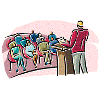Department of Teaching, Learning, and Teacher Education

Department of Teaching, Learning, and Teacher Education: Presentations
Date of this Version
4-2019
Document Type
Article
Citation
Lewis, E. B., L. Lucas, A.L, Tankersley, E. Hasseler, and B. Helding. (2019). Measuring and Modelling How and When Effective Science Teaching Occurs. Papers presented at the annual meeting of the National Association for Research in Science Teaching (NARST): March 31-April 3, 2019: Baltimore, Maryland, United States.
Abstract
With new national science education standards, we must understand how to prepare science teachers capable of advancing reform initiatives. In a 3-year longitudinal study we adopted a multi-method approach to investigate beginning science teachers’ instructional practices. We analyzed transcripts, administered a teaching self-efficacy survey, observed science lessons, and documented weeks of lessons. Using this large dataset, we posed research questions about the use of NGSS scientific practices in teachers’ science lessons (Paper #1) and teacher- and student-level characteristics as it relates to teachers’ use of inquiry in the classroom (Paper #2). In order to expand our coding capability of science teaching data for use in our structural equation modelling efforts (Paper #4) we also completed an initial validation of the DiISC instrument (Paper #3). Findings included: (a) differential use of scientific practices by physical and life science teachers in their lessons; (b) beginning teachers had lower levels of assessment use and there was little evidence to suggest that assessment varied greatly by classroom diversity; (c) evidence for the validity of the DiISC with factor analyses, correlations with the EQUIP instrument, and think-aloud and semi-structured interviews with DiISC raters; and (d) an SEM showed master’s level teachers exhibited greater initial use of inquiry-based instruction and growth over time than undergraduate certified teachers with many contributing factors.
Included in
Junior High, Intermediate, Middle School Education and Teaching Commons, Science and Mathematics Education Commons


Comments
Copyright 2019, Lewis, Lucas, Tankersley, Hasseler, and Helding. Used by permission